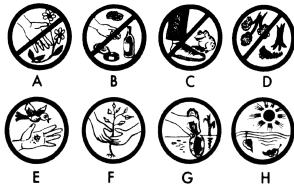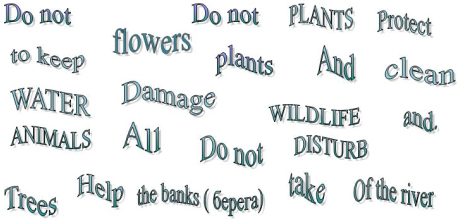- Преподавателю
- Другое
- Урок английского языка по теме: How Do You Treat the Earth?
Урок английского языка по теме: How Do You Treat the Earth?
| Раздел | Другое |
| Класс | - |
| Тип | Другие методич. материалы |
| Автор | Кузина Л.В. |
| Дата | 29.01.2015 |
| Формат | docx |
| Изображения | Есть |
 Урок английского языка по теме "How Do You Treat the Earth?"
Урок английского языка по теме "How Do You Treat the Earth?"
Разделы: Преподавание иностранных языков
При планировании урока мною ставились следующие цели и задачи:
-
развивающий аспект:
- развитие способности к сравнению, умозаключению;
- развитие способности к анализу; развитие воображения, эмоциональности; -
воспитательный аспект:
- развитие обеспокоенности экологической ситуацией вокруг;
- формирование желания помочь природе; -
учебный аспект: совершенствование речевых навыков (диалогической и монологической форм речи)
-
сопутствующие задачи:
- развитие умения читать и понимать на слух с общим охватом содержания;
- развитие умения читать с детальным пониманием;
- развитие умения говорить на основе услышанного и прочитанного.
Речевой материал: лексика и грамматика по теме, отрывок из истории "Fifteen Minutes Or So" by Mary E. Furlong.
Оснащение урока: ТСО, видеоматериалы, карточки с индивидуальными заданиями.
Содержание учебного материала, формы и методы работы на уроке, его цели и задачи соответствуют программе УМКа В П Кузовлева и ориентированы на уровень знаний учащихся по предмету.
Для реализации целей и задач мною используются средства обучения - видеоматериалы, наглядность, опережающие задания, карточки с индивидуальными заданиями Их применение позволяет активизировать познавательную деятельность, сделать материал более наглядным и образным.
Организационная структура урока соответствует типу урока комплексного применения знаний , умений и навыков (ЗУН)
Работа способствует развитию самостоятельного мышления, творческого подхода к делу, умению обобщить, осуществить умозаключение от частного к общему.
В течении всего урока мною создаются условия для самостоятельности в учебной деятельности, формированию навыков учебного труда, осуществляется деятельный подход в обучении.
Урок имеет логическое завершение. На мой взгляд цели и задачи урока достигнуты, основные дидактические принципы соблюдены.
Ход урока
I. Организация класса:
Беседа с дежурным: Учебный разговор: T P1:
-
T. Who is on duty today? .
T. What day of the week is it today?
T. What date is it today?T. Who is absent today? .
P1. I am. I am on duty today.
P1. Today is Tuesday.
P1. Today is the 20th (5th, etc.) of
December (November, etc.)
P1 ……..is (are) absent today.
Teacher: Children, the topic of our lesson is " How do you treat the Earth?'. Today we are going to talk about ecological problems in our town and in the world, to watch TV, to listen to your classmates' stories about the ecological situation in our place and read the text. How do we treat the Earth? I want you to try to find the answer on this question. This question is very important. The work will be difficult, but interesting. But at first I want you to pronounce after me a beautiful poem about our nature.
II. Фонетическая зарядка:
Yours and Mine.
Ff. Sherman
The sun, the trees, the grass, the sky,
The silver moon that's sailing by,
The rain and dew and snowflakes white,
The flowers sweet and stars at night!
The song of birds, wind whispering -
Such lovely things to hear and see
Belong to you, belong to me.
III. Речевая зарядка:
Teacher: Children, our planet is beautiful and suitable for people to live. But our planet and life on it are in danger.
T. - Ask him\ her (P1) if our drinking water is full of chemicals.
P1. - Is our drinking water full of chemicals?
P2. - Yes, it is. Our drinking water is full of chemicals. The seas are dirty, because we continue to put chemicals and litter into them.
T. - Ask him\her (P1) if animals are in danger.
P1. - Are animals in danger?
P2. - Yes, they are. Animals are in danger. We pollute the atmosphere and disturb the wildlife. A lot of animals are disappearing.
T. - P1. - P2.
T. - Ask him\ her if paper comes from trees.
P1. - Does paper come from trees?
P2. - Yes, it does. Paper comes from trees. If you use a lot of paper we kill a lot of trees. Three hundred thousand square kilometers of forests disappear every year.
T. - P1. - P2.
T. - Ask him \ her if our factories throw a lot of dirt into the air.
P1. - Do our factories throw a lot of dirt into the air?
P2. - Yes, they do. Our factories throw a lot of dirt into the air. We are polluting the atmosphere.
IV. Основной этап урока:
Teacher: Pupils, all these problems are very serious and important all over the world. Our district (town) is the part of the world and naturally Norilsk has a lot of ecological problems.
What are they?
P1. - Litter is left.
P2. - Our water is polluted.
P3. - Our air is polluted. etc.
Teacher: You are right. I want you to watch two fragments about ecological situation in our town. Your classmates (2 pupils) are ready to comment on these fragments.
(Просмотр видеосюжетов.)
The first pupil's report: There are many ecological problems in our area, but air pollution is the main problem of our town. Our factories pollute the air we breath, the water we drink, the land we live on and destroy the ozone layer. Eighteen thousand tons of dust are thrown out. Air is made dirty and I really think our health is affected. A lot of dangerous waste is carried by winds over great distances. The Earth is our home. We must take care of it for ourselves and for the next generations. I want to say: People, don't pollute the air!
The second pupil's report: - Look at this picture. Disgusting! Not only in spring, but especially in spring I can see a lot of litter near my house and all over the town. I know that our people do it. They throw away old things, clothes, toys, bottles and plastic bags. They throw too much and in the wrong place. May be they don't know the 3 R's: reduce, reuse, recycle. What a pity!
I want to say : People, take litter home!
T. - The 3 R's. But what does it mean? Let us revise.
P1.- Reduce - сокращать, уменьшать.
Reuse - использовать снова
Recycle - перерабатывать.
Т. - Children, from your point of view, is it important to remember about the 3R's? Am I right?
Children: - Yes, of course.
T. -- What for?
P. - To protect nature.
To reduce pollution.
Not to spoil the environment.
Not to damage nature. Etc.
T. - But what can we reduce?
P. - We can reduce using electricity, using water.
T. - But what can we reuse?
P. - We can reuse glass bottles.
T. - But what can we recycle?
P. - We can recycle newspapers, cartoons, plastic bottles and containers, cans.
T. - Pupils, having watched the film and listened to the pupils' reports I want to ask you: " How do we treat the Earth? Well or awful?"
P. - Awful.
T. You are quite right, children. Pollution is getting worse and worse. But there is always hope. We'll protect our nature, keep our environment clean, if we do something. For example, to remember the 3 R's. Let us speak about Mr. Hardy from the story " Fifteen minutes or so". Do you remember him?
Проверка домашнего задания: (для домашнего задания был задан отрывок из истории "Fifteen Minutes Or So" by Mary E. Furlong из книги для чтения. )
T. - I'll give some minutes to review the text.
На доску выписать: (снятие фонетических трудностей.)
West Smithvill
garbage
garage
minutes
(Во время чтения текста, три учащихся получают карточки с индивидуальными заданиями - карточки прилагаются.)
Работа с текстом.
1) Снятие фонетических трудностей.
2) Обсуждение содержания текста.
Answer the questions: T. - P1, P2, P3.
-
What did Mr. Hardy do every day? (He drove a bus in West Smithvill.)
-
2. How long did he wait at the end of the line? (He waited fifteen minutes or so)
-
3. Did he like to wait? (No, he did not)
-
Why did not he like to wait? (There was nothing to see at the end of the line. Nothing, but garbage and dirt, and weeds.)
-
What did he do one day? (He cleaned up some of the garbage.)
-
What did he do then? (He pulled up the weeds.)
-
What did he do then? (He planted flowers at the end of the line.)
-
How long did he work every day? (He worked only fifteen minutes or so.)
Teacher: He cleaned up the garbage, pulled up weeds, and planted flowers. What was the result of his work?
P1. - Soon the end of the line looked like a brand - new place, neat and clean.
Teacher: Could Mr. Hardly change the end of the line?
P2. - Yes, he could.
Teacher: - Children, what do you think, could Mr. Hardly protect nature in his community?
P1. - Yes, he could.
Teacher: - How does he treat the Earth, well or awful?
P1. - Well, he treats the Earth well.
Teacher: - Do you want to treat the Earth as Mr. Hardy?
P1. - Yea, of course. We want to treat the Earth as Mr. Hardy.
Teacher: - Why?
P4. - Because the Earth is our home and we must protect our planet not only for ourselves, but for the next generations.
Teacher: - Children, I think you agree with me, that if you want to do something useful, you will find time to do this.
Our short discussion is over for today. I am sure, you are real friends of our planet, we all must do what we can to keep the air, water and land clean.
V. Заключительный этап урока:
Teacher: Your work today was excellent. Your marks are….. .
Your home task is:
a) Make up the story: "What can you do for the community in fifteen minutes or so?"
b) The poem " Your and Mine" by Fr. Sherman - by heart.
(Карточки с индивидуальными задания, данными на уроке, сдаются в конце урока на проверку.) [1,2]
* CARD №1
Match the words in Column A with the words or phrases in Column B that best describe them:
-
Column A
1) forecast
2) meteorologist
3) lightning
4) to occur
5) weather map
6) thunderColumn B
a) a flash of light in the sky
b) a loud noise
c) a picture if the weather drawn by the scientists
d) predict
e) a scientist who studies the weather
f) to happen
** CARD №2
March the phrases with the pictures that best describe them:
-
Do not pick wild flowers.
-
Feed birds and help them.
-
Clean rivers and springs.
-
Do not litter the ground with cans, paper and bottles.
-
Do not frighten animals.
-
Plant trees and flowers.
-
Recycle used materials such as metal, bottles and paper.
-
Do not harm plants.

Рис. 1
*** CARD № 3
Make up phrases:

Рис. 2
Литература:
-
Т.Б. Климентьева, Джил Албикер Шеннон "Happy English-2" для 7-9-х классов, издательство "Титул", 2001 г.


